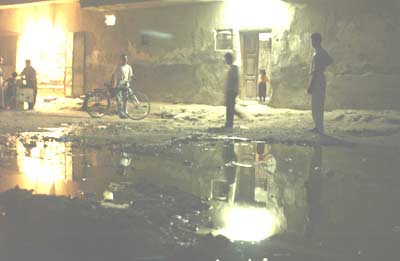|
Peace Team Details | Reports | Messages to
The impact of war on education
Baghdad, February 4, 2003
Mick for Mary and Lisa
 In the southern port city of Basrah we meet with Nadra, a middle-aged woman,
who faces immense challenges as principal of an elementary school. Like many
families in Basrah, Nadra lives in a concrete and rather non-descript
building. The narrow street outside her home is lined with elevated
concrete sidewalks and puddles of stagnant water pool in the depressions of
the tattered road. There are a few cars parked along the street, further
narrowing the passage of vehicles. A few young children cease their
activity and gaze at us in curiosity as we disembark from the van. The sun
has just set and the shadows have turned to near darkness.
In the southern port city of Basrah we meet with Nadra, a middle-aged woman,
who faces immense challenges as principal of an elementary school. Like many
families in Basrah, Nadra lives in a concrete and rather non-descript
building. The narrow street outside her home is lined with elevated
concrete sidewalks and puddles of stagnant water pool in the depressions of
the tattered road. There are a few cars parked along the street, further
narrowing the passage of vehicles. A few young children cease their
activity and gaze at us in curiosity as we disembark from the van. The sun
has just set and the shadows have turned to near darkness.
Almost without exception, we have been greeted with warmth, generosity and
kindness during our interactions with Iraqis. Nadra is no exception. With
an engaging smile she graciously motions for us to enter and be seated on
the floor.
With a large contingent of eight Iraq Peace Team members, our translator and
Nadraıs husband and two young children, the small living room barely
accomodates us as we sit on the floor in a circle. The walls are stark with
only a few small pictures.
 After a round of introductions, Nadra tells us that she has worked as a
principal for 14 years and before that a full-time teacher for 10 years.
Her school, for girls aged six to eleven, hosts 570 students but has a staff
of only 24 teachers. The high student to teacher ratio means class sizes of
55 to 60 students with one teacher per class. Through our translator, Nadra
continues to explain that ³the economic sanctions have had many effects,
including the overcrowding of schools. We are unable to build new schools
to keep up with the growing enrollment figures. This means that average
class sizes have increased from about 30 students before the sanctions to
the current numbers. This is very difficult for both teachers and for
students.²
After a round of introductions, Nadra tells us that she has worked as a
principal for 14 years and before that a full-time teacher for 10 years.
Her school, for girls aged six to eleven, hosts 570 students but has a staff
of only 24 teachers. The high student to teacher ratio means class sizes of
55 to 60 students with one teacher per class. Through our translator, Nadra
continues to explain that ³the economic sanctions have had many effects,
including the overcrowding of schools. We are unable to build new schools
to keep up with the growing enrollment figures. This means that average
class sizes have increased from about 30 students before the sanctions to
the current numbers. This is very difficult for both teachers and for
students.²
Access to other school necessities is very limited. ³We often have to use
old books that are not in good shape. Occasionally we get new books and
this is most welcome.²
The incredible devaluation of the Iraqi dinar has eroded the purchasing
power of teachers to the point where many of them are leaving the profession
or taking evening jobs in order to meet basic needs. Another teacher we
met, Amal, left her Baghdad elementary school and the profession two years
ago after her initial request for early retirement was declined by the Iraqi
Government. ³They denied my request because we need teachers. But I am
unable to support my three children on a salary that low. I can so much
better as an artist. ² Her living room walls are adorned with many of her
beautiful oil paintings, capturing Iraqi life in its many facets.
According to Nadra, ³many Iraqi children also work to help support their
families.² As we have walked the streets of both Baghdad and Basrah, the
presence of young shoeshine boys has been constant.
The current situation in Iraq also has non-material effects on the learning
environment in Iraqi schools. Only two months ago, Nadra tells us, American
jets bombed a factory not too far away from her school. ³The children are
afraid. They know what is happening and we try our best to comfort our
children. But it is difficult. Many children are unable to concentrate,²
she tells us as she shifts slightly. Despite the hardship ³students still
think about completing their studies. They dream of becoming teachers,
doctors and artists.
That evening as we get back to our hotel room I reflect on the what we have
heard. As a school teacher myself I canıt imagine how they continue, given
the current situation. As Iım talking to my roommate Bret, our discussion
is pierced by the wailing of a loud air siren. Though Iıve never before
experienced this, I feel a chill down my spine as I think of the children of
Basrah. As it turns out, the siren indicates the presence of U.S. airplanes
in the vicinity. A second air siren sounds minutes later, indicating that
the threat has passed.
But of course it hasnıt.
|